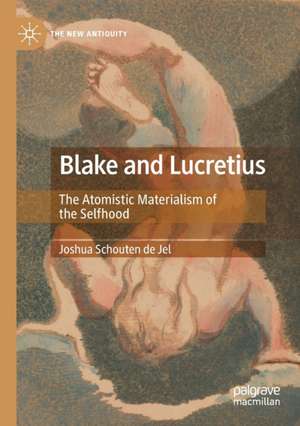Blake and Lucretius: The Atomistic Materialism of the Selfhood: The New Antiquity
Autor Joshua Schouten de Jelen Limba Engleză Paperback – 25 noi 2022
This book demonstrates the way in which William Blake aligned his idiosyncratic concept of the Selfhood – the lens through which the despiritualised subject beholds the material world – with the atomistic materialism of the Epicurean school as it was transmitted through the first-century BC Roman poet and philosopher Lucretius’ De Rerum Natura. By addressing this philosophical debt, this study sets out a threefold re-evaluation of Blake’s work: to clarify the classical stream of Blake’s philosophical heritage through Lucretius; to return Blake to his historical moment, a thirty-year period from 1790 to 1820 which has been described as the second Lucretian moment in England; and to employ a new exegetical model for understanding the phenomenological parameters and epistemological frameworks of Blake’s mythopoeia. Accordingly, it is revealed that Blake was not only aware of classical atomistic cosmogony and sense-based epistemology but that he systematically mapped postlapsarian existence onto an Epicurean framework.
| Toate formatele și edițiile | Preț | Express |
|---|---|---|
| Paperback (1) | 637.46 lei 6-8 săpt. | |
| Springer International Publishing – 25 noi 2022 | 637.46 lei 6-8 săpt. | |
| Hardback (1) | 643.99 lei 6-8 săpt. | |
| Springer International Publishing – 24 noi 2021 | 643.99 lei 6-8 săpt. |
Preț: 637.46 lei
Preț vechi: 749.95 lei
-15% Nou
Puncte Express: 956
Preț estimativ în valută:
121.99€ • 126.89$ • 100.71£
121.99€ • 126.89$ • 100.71£
Carte tipărită la comandă
Livrare economică 14-28 aprilie
Preluare comenzi: 021 569.72.76
Specificații
ISBN-13: 9783030888909
ISBN-10: 3030888908
Pagini: 266
Ilustrații: X, 266 p.
Dimensiuni: 148 x 210 mm
Greutate: 0.34 kg
Ediția:1st ed. 2021
Editura: Springer International Publishing
Colecția Palgrave Macmillan
Seria The New Antiquity
Locul publicării:Cham, Switzerland
ISBN-10: 3030888908
Pagini: 266
Ilustrații: X, 266 p.
Dimensiuni: 148 x 210 mm
Greutate: 0.34 kg
Ediția:1st ed. 2021
Editura: Springer International Publishing
Colecția Palgrave Macmillan
Seria The New Antiquity
Locul publicării:Cham, Switzerland
Cuprins
Chapter 1: Introduction.- Chapter 2: The Epicurean and Lucretian Slur: Francis Bacon.- Chapter 3: The Epicurean and Lucretian Slur: Isaac Newton.- Chapter 4: Simulacra and the Selfhood.- Chapter 5: Urizenic Phantasiae.- Chapter 6: The Cosmic Chains of the Machina Mundi.
Notă biografică
Joshua Schouten de Jel is a recent doctoral graduate from the University of Plymouth, UK. He is the author of articles on William Blake, Mary Shelley, and Jean-Jacques Rousseau.
Textul de pe ultima copertă
“Blake and Lucretius: The Atomistic Materialism of the Selfhood belongs both to the new field of Romanticism and Science and to an older current of esoteric source studies in Blake. Schouten de Jel argues that a number of interconnected patterns of imagery by which the poet delineates the fallen world and its deficits, are drawn from Epicurean and Lucretian tradition, much of it as adopted or reshaped in European intellectual history of the 15th, 16th and 17th centuries. The book is a treasure-trove of scholarship. It both demonstrates the systematicity and consistency of Blake’s imagery and illuminates it, making us see familiar language in a novel and enriching context. Blake’s rocks, watches, revolutions and sunflowers take on a new saliency and a new halo of associations.”
—Laura Quinney, Professor of English, Brandeis University, USA
This book demonstrates the way in which William Blake aligned his idiosyncratic concept of the Selfhood – the lens through which the despiritualised subject beholds the material world – with the atomistic materialism of the Epicurean school as it was transmitted through the first-century BC Roman poet and philosopher Lucretius’ De Rerum Natura. By addressing this philosophical debt, this study sets out a threefold re-evaluation of Blake’s work: to clarify the classical stream of Blake’s philosophical heritage through Lucretius; to return Blake to his historical moment, a thirty-year period from 1790 to 1820 which has been described as the second Lucretian moment in England; and to employ a new exegetical model for understanding the phenomenological parameters and epistemological frameworks of Blake’s mythopoeia. Accordingly, it is revealed that Blake was not only aware of classical atomistic cosmogony and sense-based epistemology but that he systematically mapped postlapsarian existence onto an Epicurean framework.
Joshua Schouten de Jel is a recent doctoral graduate from the University of Plymouth, UK. He is the author of articles on William Blake, Mary Shelley, and Jean-Jacques Rousseau.
—Laura Quinney, Professor of English, Brandeis University, USA
This book demonstrates the way in which William Blake aligned his idiosyncratic concept of the Selfhood – the lens through which the despiritualised subject beholds the material world – with the atomistic materialism of the Epicurean school as it was transmitted through the first-century BC Roman poet and philosopher Lucretius’ De Rerum Natura. By addressing this philosophical debt, this study sets out a threefold re-evaluation of Blake’s work: to clarify the classical stream of Blake’s philosophical heritage through Lucretius; to return Blake to his historical moment, a thirty-year period from 1790 to 1820 which has been described as the second Lucretian moment in England; and to employ a new exegetical model for understanding the phenomenological parameters and epistemological frameworks of Blake’s mythopoeia. Accordingly, it is revealed that Blake was not only aware of classical atomistic cosmogony and sense-based epistemology but that he systematically mapped postlapsarian existence onto an Epicurean framework.
Joshua Schouten de Jel is a recent doctoral graduate from the University of Plymouth, UK. He is the author of articles on William Blake, Mary Shelley, and Jean-Jacques Rousseau.
Caracteristici
Explores the Epicurean legacy in William Blake’s work Shows that Blake was deeply influenced by Lucretian materialism Offers new insights into the reception of Lucretius across Europe from the seventeenth century onwards












